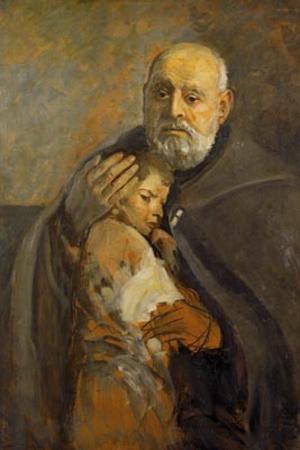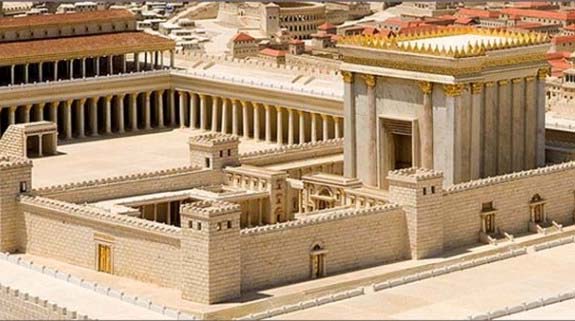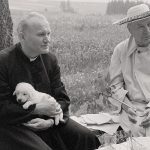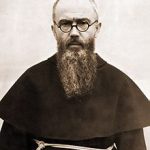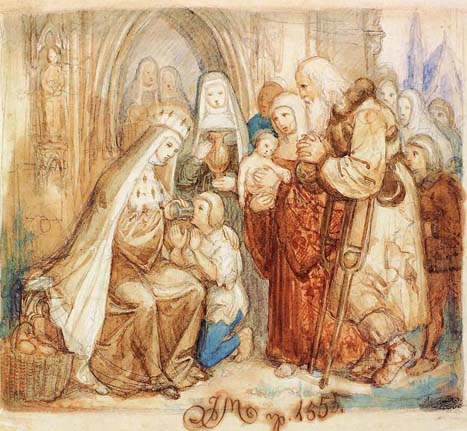In day 5 of August 1864 r. Thousands of people gathered at the Warsaw Citadel. Five members of the government of the January Uprising were led to execution. Among them was Romuald Traugutt. He did it for half a year, until his arrest in April 1864 r., he headed the government and led the uprising. Today on the spot, where Traugutt and his four companions were executed at the gallows, there is a cross and a memorial plaque.
Day 21 January 1963 A memorial plaque was placed next to the Smolna Street, which no longer exists today. It was on this street that Traugutt once lived as the leader of the uprising. The next day, the Museum was opened in the 10th Pavilion of the Warsaw Citadel ; right here, In one of the cells, Traugutt spent the last four months of his life as a prisoner. The highest representatives of the Polish government attended this ceremony. Who was this man, that 100 years after his death, Poland remembers and pays tribute to him ?
Romuald born in 1826 he spent his childhood and adolescence in his home region on the border of Podlasie and Polesie. He was gifted and intelligent. After graduating from high school in Świsłocz (with a gold medal) chose a military career. He spent the first years of his service at the Military Engineering School in Żelechów, in the Łuków poviat. These were the most peaceful and happiest years of his life. Ten, who in the future was to die for the freedom of his homeland, Polish, in year 1849 he had to take part in the expedition of the Russian army against the uprising in Hungary.
Soon after the wedding, he went to the Crimean War. It took him nearly three years to live. Always extremely composed, in the hardest moments of the fight, he was able to keep calm and cool. Therefore, the reports of the commanders expressed great appreciation about Traugut.
After the war, he became the general liquidator of economic affairs of the Southern Army. He turned out to be a man of great honesty, far from bribery, so common in his environment. Later transferred to St. Petersburg, he became an instructor and lecturer at the Military School of Engineering. Promotion to the rank of captain and the Order of St.. Anne of the 3rd class augured a great future for the young officer.
However, fate decreed otherwise. After the death of two children and his beloved wife, he felt bad in this city, in which this misfortune befell him. He missed his homeland. On urgent requests, he was discharged from the army with the rank of lieutenant colonel. Having married again, he settled on the land of his native land, to take care of raising two daughters from her first marriage. Far from any political ambition, he wanted to lead a life of a peaceful man.
The January Uprising broke out. Traugutt was sober, as a specialist in military affairs he was well aware, to what inconsiderate leaders pushed the nation. At the trial, he said : ,,I didn't advise anyone about the uprising ". Months passed, and he wasn't joining the fight. He did so only in May 1863 year. He took command of a small insurgent unit, after defeating which he came to Warsaw. The government appointed Traugutt a general and entrusted him with the office of extraordinary commissioner.
When the others failed and there was no man, who would have the courage and the ability to direct the uprising further, Romuald Traugutt undertook it in Warsaw. He assumed supreme power. He became a dictator. He wanted to save the nation. ,,Power is an act of sacrifice with us, not ambition ”he repeated many times. From then on, the entire burden of managing the fight for Poland's liberation rested on his head. It was lit in the room until late at night, in which alone, away from the family, he drafted government decrees and instructions.
He wanted to create a well-functioning administration, which was so painfully lacking before. He wanted to transform the guerrilla troops into a regular army. He paid close attention to the peasants. In them, he saw the essential strength in the fight against the enemy. In them he saw the last hope of victory.
He was not persuaded to use terror and cruelty against the enemy, as well as to their opponents.
Deeply believer in God, he has not neglected anything by human means, that could lead to victory. He was not afraid to summon the peasants to fight the enemy. He has seen, that it is difficult for peasants to fight for freedom, which they haven't had for several centuries. He saw their hurt. Therefore, he strictly implemented the decree on their enfranchisement. Even though he showed a mature and rational attitude, he had no shortage of opponents.
In the chosen post he endured until the end. When others see, what's the threat, they moved away or fled abroad, it lasted. Until the last days, he worked in Smolna Street. It continued even then, when the arrested broke down and betrayed others. Traugutt understood, that love for the homeland requires him, to remain in position until the end. He was aware of this, that he must not run away and leave the struggle for the freedom of the Fatherland to fate. Romuald Traugutt could drop everything and run. Yet he did not. He remained in office until his arrest.
Where did Traugutt get such strength from? ? What was he guided by in his life ? He was a deeply religious and practicing man. He prayed often and much. His correspondence, especially the one from the times, when he was the dictator of the uprising, it is very telling about it, that he was guided by the principles of the Gospel in his life.
Religion drew the strength to do so. Religion pervaded his entire life. In it he found a source of strength, to endure to the end. This is evidenced by his words to General Hauke-Bosak shortly before his arrest :
“In our current situation, there are often many things that cannot be done, as is understood and as necessary ; at such times you have to do, whatever you can, and boldly send the rest to God. Sincere work and good intentions, sooner or later God will always help and bless…”
These words of Traugutt confirm once again, that his love for Poland flowed not only from the fact, that he was a Pole, but especially from his conviction imbued with the spirit of the Gospel of Christ.

